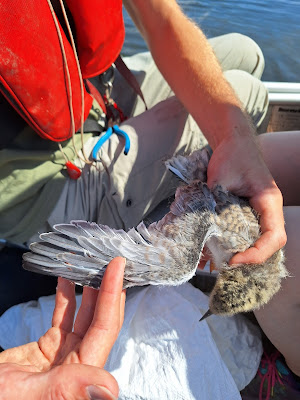Here’s a selection of the recoveries from the second half of the year.
First, the Cormorants. The very few we have ringed recently, along with older birds, are still
providing valuable information from this inland colour-ringing project based at Attenborough Nature
Reserve.
- A bird ringed on 17 April (CSV) was seen on 22 October on the Wirral at Hoylake Shore.
- Another, that had been ringed on 7 May (CSZ) was re-sighted near Crosby, also in Merseyside, on the same date in October.
- Also ringed in 7 May, another bird (CZ7) was noted closer by at Thornton Reservoir, Leicestershire in October, and again on 2 November.
- An older Attenborough bird (CRB), ringed in 2018, was seen near Sizewell Power Station in Suffolk on 21 November. This bird was also seen at Colwick Park and Holme Pierrepont earlier in the year and has been seen numerous times locally as well as at Rutland Water and Minsmere since it was ringed.
- Finally, an external bird, ringed in Blomendaal, Netherlands in June 2024, was seen at Colwick Park on 4 September. This bird has been seen regularly over the river at Holme Pierrepont since August 2024.
Our Group is probably leading on the ringing of inland-breeding Cormorants, and colour ringing them adds hugely to the value of this.
 |
| One of our Colour-ringed Cormorants by Richard Smith, Dee Estuary Birding. |
 |
| Dispersal of Cormorant chicks ringed on 7 May at Attenborough NR. |
Teal, a species not ringed with any regularity by the group, but targeted by Mick P during the winter
months, is not a common feature of the recovery section. A bird ringed at Shelford 8 years ago in
2017, was shot near Ringkobing, Denmark on 21 October this year. A good movement, shame about the circumstances.
Black-headed Gull ring-reading season has got off to a slow start by Tom, with regular 7JJ from
Denmark seen at Blott’s Pit, Holme Pierrepont on 8 August and again at its usual haunt of Trent
Bridge on 19 November.
A Sand Martin, ringed in the nest at Wanlip in Leicestershire on 22 May, was retrapped 22 days
later at Attenborough.
A Redwing, ringed in November 2024 at Brackenhurst, was captured by a ringer in Birkeland (not
Birklands!), Rogaland, Norway on 13 October this year. This is one of very few subsequent recaptures of Redwing we have received, despite ringing a decent number each year.
One of many Starlings ringed at the Meadows, originally ringed as a juvenile in May 2023, has been
seen using the feeders in a private garden in nearby Wilford. Not a huge movement but great that
the homeowners put the effort in to read the ring.
Onto the warblers, and a Reed Warbler ringed as a juvenile at Holme Pierrepont in July 2018 was
caught on 2 occasions this summer at Marston STW near Grantham. This is the first time it has been re-caught since being ringed 7 years ago.
A Blackcap, ringed at Allestree Park on 9 September, was caught a couple of weeks later at
Titchfield Haven on the Hampshire Coast on the 25 Sept. Another, ringed at Holme Pierrepont in August 2024, was caught by ringers in France this September near Saint-Soline in the west of the country.
A Chiffchaff caught at Ramsdale Golf Club on 2 August, made a similar movement and was caught 6 weeks later down in Medway on the 14 September.
A Garden Warbler caught at Manor Floods in Ilkeston on 9 August had originally been ringed at
Stanford Reservoir in August 2024.
Goldcrest recoveries don’t come regularly as they are not caught in big numbers by the group, so to
have two this autumn is interesting. The first was a bird controlled at Allestree on the 19 September, which had been ringed 22 days prior at Planetrees in Northumberland. The second bird was captured at Ramsdale park on 25 October, having been ringed 13 days prior at Robin Wood near Ticknall in Derbyshire.
A Goldfinch, ringed in Colwick in October was caught 2 weeks later on 1 November in Icklesham,
East Sussex.
There’s been a few Redpoll around this autumn and as usual, are providing some movements
between ringers:
- A bird ringed at Loch of Leys in Aberdeenshire on 16 September was captured at Ramsdale Gold Cub on 18 October
- An older bird ringed in October 2023 at Holland Haven in Essex was re-trapped at Holme Pierrepont on 22 October this year
- Another, ringed at Foxglove Covert Reserve near Catterick, North Yorks on 14 October was recaught at Bestwood on 18 November.
- And a bird ringed by Mick P at Bestwood on 9 October, moved a short distance to Hanger Hill in Sherwood Forest, retrapped there on 5 November
Tom













































.jpg)
.jpg)
.jpg)
.jpg)


